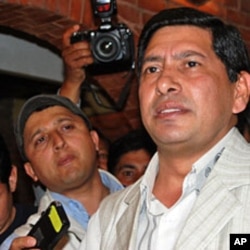A volatile political stalemate continues in one of Asia's poorest countries, Nepal. Tuesday marks the 4th consecutive day of a Maoist show of force across the country. There is no sign the former rebels are preparing to end their street action, which has paralyzed nearly all public activities, including commerce.
Leaders of Nepal's big three political parties have again failed to defuse the country's political crisis, but they say the good news is that they will continue to talk with each other.
After discussions with the Nepali Congress Party, the vice chairman of the (United Communist Party of Nepal-) Maoists, Narayan Kaji Shrestha, told VOA News all issues are back on the table.
"We discussed all the issues related to the government, related to the peace process and the constitution-making process. But we could not reach any consensus today, so we have got the conclusion that we will discuss tomorrow [Tuesday] also," said Shrestha.
The Maoists contend they are showing new flexibility by their willingness to discuss a "package" accord rather than by demanding the resignation of Prime Minister Madhav Kumar Nepal as a prerequisite to agreement on other issues. But during the street rallies that have paralyzed commerce in the capital, Maoist speakers continued to insist the nationwide strike will not end until Mr. Nepal resigns.
The United Marxist Leninist Party of the prime minister and the Nepali Congress Party insist that unless the Maoists first halt the crippling strike, they will not support a change of government.
Nepali Congress Party vice president, Ram Chandra Paudel, was asked by VOA if any progress has been made in the latest series of one-to-one talks the three parties have been holding.
"There are some differences among us. We became ready to solve these problems and tomorrow again we will discuss," said Paudel.
Participants say another key sticking point remains how to integrate nearly 20,000 former armed rebels into the army as called for in the 2006 peace accord.
That issue, along with drafting a new constitution, is supposed to be settled by the 28th of this month.
The Maoists won the most seats in the 2008 election, but Prime Minister Nepal is supported by the majority of the political parties in the national assembly.
The standoff threatens to unravel the peace process, raising fears the country could head back to armed conflict reminiscent of the decade-long civil war.
Civic life has ground to a halt in this Himalayan nation since Saturday when tens of thousands of Maoists and their supporters took control of the streets. Cadres armed with bamboo sticks are enforcing a shutdown of all activities, except for emergency services. There is a two-hour grace period daily for people to buy food and other essential items.
The mass act of civil disobedience has remained largely peaceful, but there have been minor clashes between some rock-throwing protesters and riot police. Local media also report some scattered incidents of attacks on businesses defying the ban on commerce.









